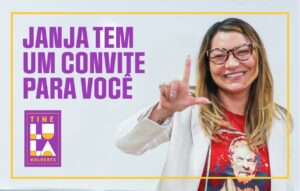On Monday, April 22, former-president Luiz Inácio Lula da Silva received the “Pursuit of Peace” award from the International Crisis Group Lula was honored for having “propelled his country to a new economic and political era.”
To download high-resolution photos, visit Picasa do Instituto Lula.
The award recognizes the work that Lula has done to bring millions of people out of poverty and in creating a policy of partnerships with neighbors and African countries, which has transformed Brazil into a “crucial world actor”.
In his speech, Lula suggested that efforts to combat hunger and poverty can be a way to transform the 21st century into an era of peace. “Combating hunger and poverty on a global scale is the most important step we can take on the road to peace. And after what we have managed to achieve in Brazil, I refuse to doubt our ability to create a better world. By combating hunger and poverty, promoting dialogue and respect among peoples we can make the 21st century an era of peace.”
The Crisis Group works in more than 60 countries for the prevention and solution of conflicts. Its reports and analyses are respected by actors ranging from governments to the press as reference documents on local crises around the world. “We believe that to end conflicts it is necessary to understand them in depth,” explains Louise Arbour. Among the invited guests for dinner on Monday in New York were mega-investor and philanthropist George Soros, Nobel Prizewinner in Economics Joseph Stiglitz and Mo Ibrahim, a Sudanese entrepreneur who was the pioneer of the “cellular revolution” in Africa.
Javier Ciurlizza, the head of the Crisis Group’s program for Latin America and the Caribbean said that without hope there is no peace, and that Lula put that into practice. “He argued in favor of the Union of South American Nations as a place where nations converse rather than fight. He has worked at the heart of conflict resolution. He has a profound understanding that only through the eradication of hunger and social exclusion, and providing new hope for people, are sustainable peace and security possible.”
Speech: The former president spoke for less than 25 minutes (listen to the entire speech above) and stressed that the commitment of governments to democracy and to improving the standard of living of people is the essential step toward peace. He argued once again that the world economic crisis must be confronted through development and distribution of income.
Thein Sein? On Monday evening, the President of Myanmar, Thein Sein, was also honored. General Thein Sein initiated the process of democratization of the military dictatorship that had lasted more than half a century. He called for elections, released political prisoners and allowed the return of the private press operating without prior censorship to his country. “Myanmar has undertaken a set of significant and unprecedented reforms since President Thein Sein assumed the presidency in March 2011,” said the president of the Crisis Group Louise Arbour. Nevertheless, in the opinion of the Crisis Group, the Asian country still needs to continue the process of political liberalization that they have achieved so far.”
This is the eighth year of the award. Among the personalities that are previous recipients of the honor are US Presidents Bill Clinton and George W. Bush; Nobel Peace Prize winners Martti Ahtisaari and Ellen Johnson Sirleaf, and financier and philanthropist George Soros.
The Crisis Group – www.crisisgroup.org/en/about.aspx (in English) focused on the prevention of international conflict, the International Crisis Group was founded in 1995 with the goal of establishing an organization independent of governments and with a specialized professional team “to act as the world’s eyes and ears for impending conflicts with a highly influential board, capable of mobilizing public policymakers around the world.”
The organization currently employs more than 150 people in 10 regional offices that cover approximately 60 countries in active conflict or at risk of impending conflict. The Crisis Group combines the publication of internationally respected reports and technical analyses with a Board of Directors capable of mobilizing other formulators of public policies around the world. On the board are 10 former presidents (two of these Americans), one former European Prime Minister and a Nobel Peace Prize winner, among other leaders in the fields of politics, diplomacy, business and media.


